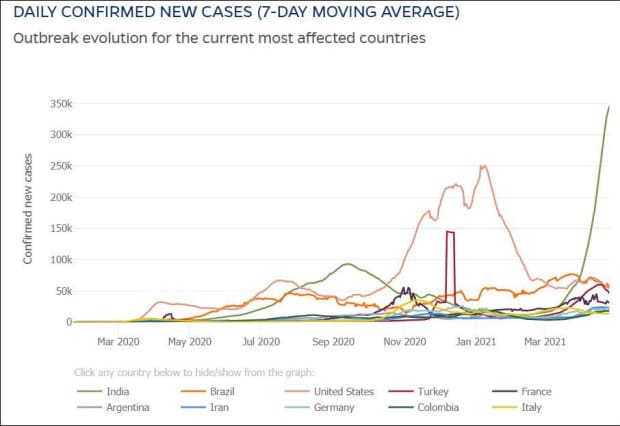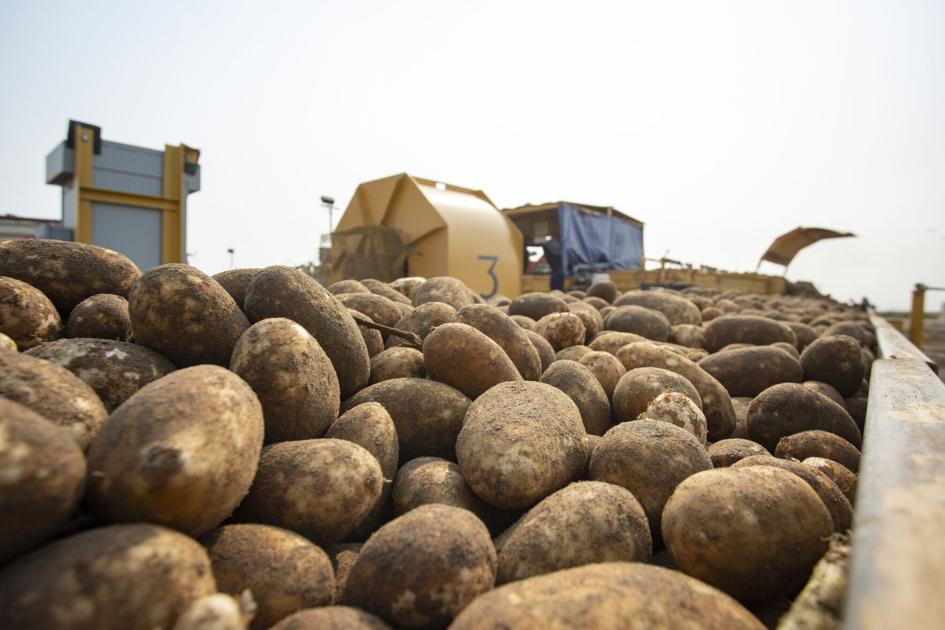The global tally of confirmed cases of the coronavirus-borne illness COVID-19 climbed above 147 million on Monday, with India accounting for more than a third of daily new cases, as Western governments, including the U.S., started to send oxygen supplies, virus tests, drug treatments and personal protective equipment to ease the crisis.
India counted another grim record of 349,691 confirmed cases on Sunday, according to the Associated Press, setting a daily global record for a fourth straight day. A new “double mutant” variant has sent cases soaring, and undermined the government’s premature claims of victory over the pandemic.

Source: Johns Hopkins University
The Health Ministry reported another 2,767 deaths in the past 24 hours, pushing India’s fatalities to 192,311. Experts say this toll could be a huge undercount, as suspected cases are not included, and many COVID-19 deaths are being attributed to underlying conditions.
India’s overwhelmed hospitals are begging for oxygen, the shortage of which is cruelly causing many deaths in ambulances as patients wait for assistance that is not arriving. The rising death toll has also overwhelmed graveyards and crematoriums, which are forgoing Hindu ceremonies and rituals that are believed to free the soul from the cycle of rebirth.
Dr. Anthony Fauci, head of the National Institute of Allergy and Infectious Diseases and Biden’s chief medical adviser, told ABC’s “This Week” that the U.S. would review how to increase India’s vaccine supply, such as by sending doses or helping India “to essentially make vaccines themselves.”
Also on the vaccine front, a Centers for Disease Control and Prevention committee voted Friday to let Americans once again receive Johnson & Johnson’s single-shot COVID-19 vaccine without any additional stipulations.
The CDC’s influential Advisory Committee on Immunization Practices met for the second time on Friday to discuss the risks and benefits of J&J’s vaccine following reports of blood clots in combination with low platelets in six women who got the shot. At that time, roughly seven million people in the U.S. had been immunized with that vaccine.
The committee voted 10-4-0 to uphold the vaccine’s initial emergency-use authorization from the Food and Drug Administration, with many of the committee members talking about the greater risks associated with COVID-19. The EUA allows any adults in the U.S. who are at least 18 years old to get shot. Some Wall Street analysts had previously predicted that the vaccine would be no longer recommended for women younger than 50.
The U.S. vaccine program, meanwhile, continues to show good progress. The Centers for Disease Control and Prevention’s vaccine tracker is showing that as of 6.00 a.m. ET Sunday, 290.7 million doses had been delivered to states, 228.7 million doses had been administered, and 139.9 million people had received at least one shot, equal to 42.2% of the population.
A full 94.8 million people are fully vaccinated, equal to 28.5% of the population, meaning they have received two shots of the two-dose vaccines developed by Pfizer Inc. PFE, +0.04% and German partner BioNTech SE BNTX, -1.35% and Moderna Inc. MRNA, +2.27%, or one shot of the Johnson & Johnson JNJ, -0.53% one-shot vaccine. The AstraZeneca vaccine has not been authorized for use in the U.S.
Among Americans 65 years-and -older, 36.9 million people are fully vaccinated, equal to 67.5% of that group. Almost 45 million people in that age bracket have received a first jab, covering 81.5% of that population.
In good news for those people desperate to take a trip, European Commission President Ursula von der Leyen told the New York Times that she expects Americans who ae fully vaccinated, to be allowed to travel to the EU this summer.
In other news:
• The European Commission launched legal action against vaccine maker AstraZeneca PLC AZN, +0.26% AZN, -0.32% for failing to respect the terms of its contract with the EU, the Associated Press reported. Spokesman Stefan De Keersmaecker said the action is “on the basis of of breaches of the advance purchase agreement.” AstraZeneca’s contract with the European Union foresaw an initial 300 million doses for distribution among the 27 member countries, with option for a further 100 million. But only 30 million doses were delivered in the first quarter of 2021, and the company says it can only provide 70 million in the second quarter, rather than the 180 million it had promised.
• French drug maker Sanofi SA. SNY, +0.12% SAN, +0.35% has agreed to make Moderna Inc.’s COVID-19 vaccine at its site in Ridgefield, New Jersey, and will fill and finish up to 200 million doses starting in September. Chief Executive Paul Hudson said the company will also continue to work on its two COVID1-19 vaccine programs, while supporting the global effort. The move is Sanofi’s third commitment to providing manufacturing support, and comes after it said it would make 125 million doses of the vaccine developed by BioNTech SE and Pfizer Inc. for the European Union. In February, Sanofi said it would support Johnson & Johnson by making about 12 million doses of that one-shot vaccine a month at a site in France.
• Thai Prime Minister Prayuth Chan-ocha has been fined after a photo on his official Facebook page showed him maskless as he chaired a meeting about COVID-19 vaccinations, drawing criticism online, the AP reported. Thailand is imposing fines of up to 20,000 baht ($640) on people who fail to wear face masks in public in 48 provinces, as the government struggles to cope with a new wave of coronavirus cases that is straining the medical system. The capital, Bangkok, which has the largest number of cases, is also closing more than 30 types of businesses and services, including cinemas, parks, zoos, bars, pools and massage parlors. Gatherings of more than 20 people are banned.
• Bars, restaurants, cinemas and concert halls will partially reopen across Italy Monday in a boost for coronavirus-hit businesses, as parliament debates the government’s 220-billion-euro ($266-billion) EU-funded recovery plan, AFP reported. The move comes after months of stop-start restrictions imposed to manage the second and third waves of COVID-19. Italy was an early pandemic hot spot and Prime Minister Mario Draghi has been under intense pressure from regional governments and increasingly regular street protests to ease restrictions, as Italy battles its deepest recession since World War II.
• UK Prime Minister Boris Johnson denied on Monday that he has said he would rather bodies piled “high in their thousands” than order a third coronavirus lockdown, the Guardian reported. Asked whether he had made the remark, as reported by the Daily Mail newspaper, Johnson said: “No, but again, I think the important thing, I think, that people want us to get on and do as a government is to make sure that the lockdowns work, and, and they have.”
Latest tallies
The global tally for the coronavirus-borne illness rose above 147 million on Monday, as the death toll increased to 3.11 million, according to data aggregated by Johns Hopkins University.
Almost 85 million people have recovered from COVID, the data show.
The U.S. continues to lead the world in cases and deaths by wide margins, with 32 million cases, or more than a fifth of the global total, and 572,200 deaths, or almost a fifth of the worldwide toll.
Brazil is third after India with 14.3 million cases and second by fatalities at 390,797.
Mexico has the third-highest death toll at 214,947 and 2.3 million cases, or 15th highest tally.
The U.K. has 4.4 million cases and 127,681 deaths, the fifth-highest in the world and highest in Europe.
China, where the virus was first discovered late last year, has had 102,384 confirmed cases and 4,845 deaths, according to its official numbers, which are widely held to be massively underreported.
Ireland, with a population of 4.9 million, now has more fatalities from COVID than China’s official tally, at 4,873. China has a population of 1.4 billion.
What’s the economy saying?
U.S. orders for long-lasting durable goods rebounded in March after a poor showing in the prior month, but shortages of key supplies are still hampering manufacturers as they race to keep up with rising demand from customers, MarketWatch’s Jeffry Bartash reported.
Orders for durable goods rose 0.5% last month, the government said Monday. These are products such as electronics, appliances, machines, cars and other transportation equipment meant to last at least three years.
Economists surveyed by Dow Jones and the Wall Street Journal had forecast a 2.2% increase.
Orders would have been three times stronger in March, however, if not for a sharp drop in bookings for commercial and military aircraft.
Orders had decline in February for the first time since the pandemic began, mostly because of unusually harsh winter weather and a sharp drop in auto production owing to a shortage of key computers chips.
“As the economy reopens more broadly, industrial activity will continue to be propelled by strong tailwinds including large fiscal stimulus, buoyant demand, and strong corporate profits,” said lead U.S. economist Lydia Boussour of Oxford Economics. “These should more than outweigh ongoing headwinds from stretched supply chains and the global semiconductor shortage.”
See: A visual look at how an unfair pandemic has reshaped work and home
The Dow Jones Industrial Average DJIA, +0.13% and S&P 500 SPX, +0.29% were higher Monday.
April 26, 2021 at 09:30PM
https://www.marketwatch.com/story/india-sets-fresh-global-case-record-and-u-s-gears-up-to-send-oxygen-tests-treatments-and-ppe-11619447450
India sets fresh global case record and U.S. gears up to send oxygen, tests, treatments and PPE - MarketWatch
https://news.google.com/search?q=fresh&hl=en-US&gl=US&ceid=US:en

No comments:
Post a Comment